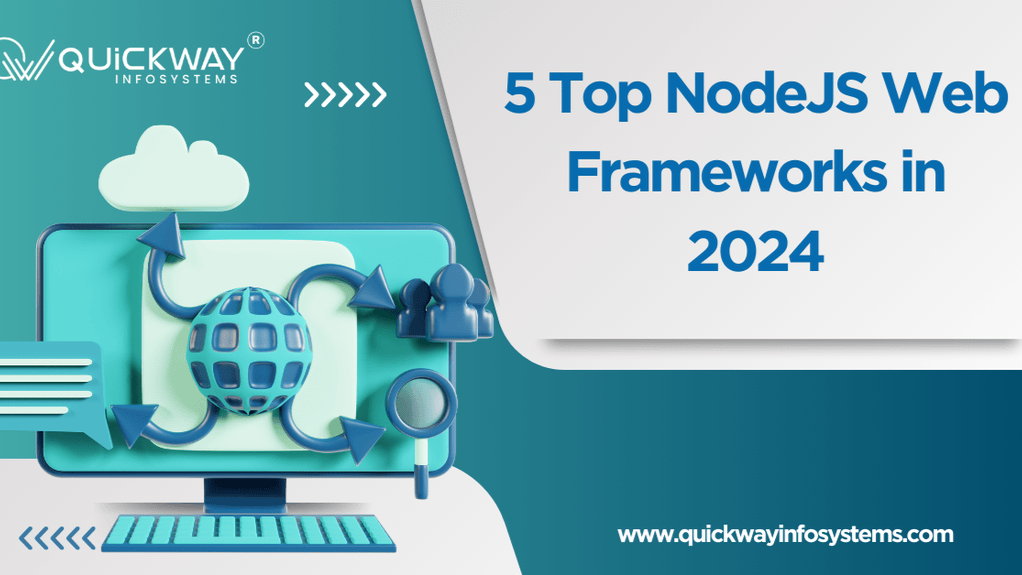
5 Top NodeJS Web Frameworks in 2024
Anuj Tomar
Hey folks This is Anuj | A Niche Site SEO Expert | Building My first niche site & sharing what I learn along the way.
NodeJS has revolutionized web development by providing a robust platform for building scalable and high-performance applications. With the advent of numerous web frameworks, developers are equipped with tools that streamline the development process, enhance productivity, and ensure code maintainability.?
In this article, we'll explore the top five NodeJS web frameworks in 2024 that you should consider for your next project.
What is NodeJS?
NodeJS is a runtime environment that allows developers to execute JavaScript code on the server side. It is built on Chrome's V8 JavaScript engine, ensuring fast and efficient performance. Since its inception, NodeJS web development has gained immense popularity due to its non-blocking, event-driven architecture, making it ideal for data-intensive real-time applications.
Why Use NodeJS Frameworks?
Using a framework can significantly enhance the efficiency and speed of development. Frameworks provide a structured foundation, reducing the amount of repetitive coding and allowing developers to focus on the core functionalities of their applications. Additionally, they often come with pre-built modules and libraries, which further accelerates development and ensures best practices are followed.
Criteria for Choosing a NodeJS Framework
When selecting a NodeJS framework, consider the following criteria:
Top NodeJS Frameworks in 2024
In 2024, the following NodeJS frameworks stand out for their features, performance, and community support:
Express.js
Overview
Express.js is one of the most popular web app frameworks . Known for its minimalistic and flexible architecture, it provides a robust set of features for web and mobile applications.
Key Features
Use Cases
Pros and Cons
Pros:
Cons:
Koa.js
Overview
Developed by the creators of Express.js, Koa.js is a next-generation framework designed to be smaller, more expressive, and more robust.
Key Features
Use Cases
Pros and Cons
Pros:
Cons:
NestJS
Overview
NestJS is a progressive NodeJS framework that builds on top of TypeScript. It aims to provide a solid foundation for scalable and maintainable server-side applications.
Key Features
Use Cases
Pros and Cons
Pros:
Cons:
Hapi.js
Overview
Hapi.js is known for its powerful plugin system and configuration-centric approach. It is designed to build robust and secure applications.
Key Features
领英推荐
Use Cases
Pros and Cons
Pros:
Cons:
Sails.js
Overview
Sails.js is a full-featured MVC framework that emulates the MVC architecture from frameworks like Ruby on Rails but uses the flexibility of NodeJS.
Key Features
Use Cases
Pros and Cons
Pros:
Cons:
Comparison of the Frameworks
Performance Comparison
When it comes to performance, Koa.js and Express.js are known for their speed and efficiency due to their lightweight nature. NestJS, while slightly heavier, offers robustness and scalability.
Scalability Comparison
NestJS and Hapi.js are particularly strong in terms of scalability, making them ideal for large, complex applications. Sails.js also scales well, especially for real-time applications.
Community Support Comparison
Express.js leads in community support, followed by Koa.js and NestJS. Hapi.js and Sails.js have smaller but dedicated communities.
How to Get Started with NodeJS Frameworks
Installation Guides
First Steps with Each Framework
Each framework has comprehensive guides to help you get started. Visit their official documentation for tutorials and examples.
Best Practices for Using NodeJS Frameworks
Coding Standards
Adhere to the coding standards recommended by each framework's documentation. This ensures consistency and maintainability.
Security Practices
Implement security best practices such as input validation, using HTTPS, and regularly updating dependencies.
Performance Optimization
Optimize performance by using efficient middleware, minimizing database queries, and employing caching strategies.
Case Studies
Successful Projects Using Each Framework
Conclusion
Choosing the right NodeJS web app development company depends on your project requirements, performance needs, and personal preferences. Whether you need the simplicity of Express.js, the modern features of Koa.js, the scalability of NestJS, the security of Hapi.js, or the real-time capabilities of Sails.js, there is a framework to suit your needs.
FAQs
What is the fastest NodeJS framework?
Koa.js is often considered the fastest due to its lightweight and modular architecture.
Which NodeJS framework is best for beginners?
Express.js is recommended for beginners due to its simplicity and extensive documentation.
Can I use multiple frameworks in a single project?
While possible, it is generally not recommended as it can complicate the project structure and maintenance.
How do NodeJS frameworks handle security?
Most NodeJS frameworks come
Full Stack Developer | 3+ Years in Node.js, NestJS, React Native, Next.js, JavaScript | MongoDB, AWS, API Development | JavaScript Expert | Immediate Joiner | Available Now | Looking for Next Opportunity | Freelancer
2 周I am looking for a job change in Nodejs (Remote Opportunity preferred) Anuj Tomar